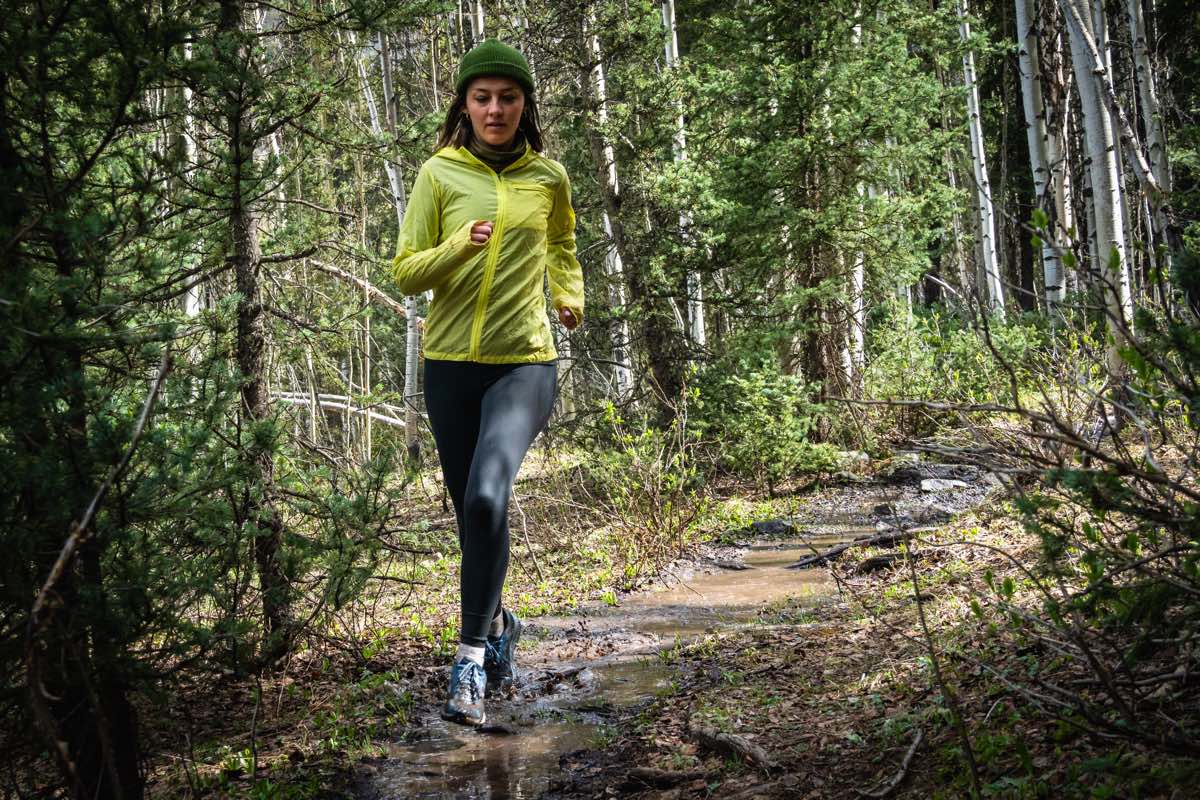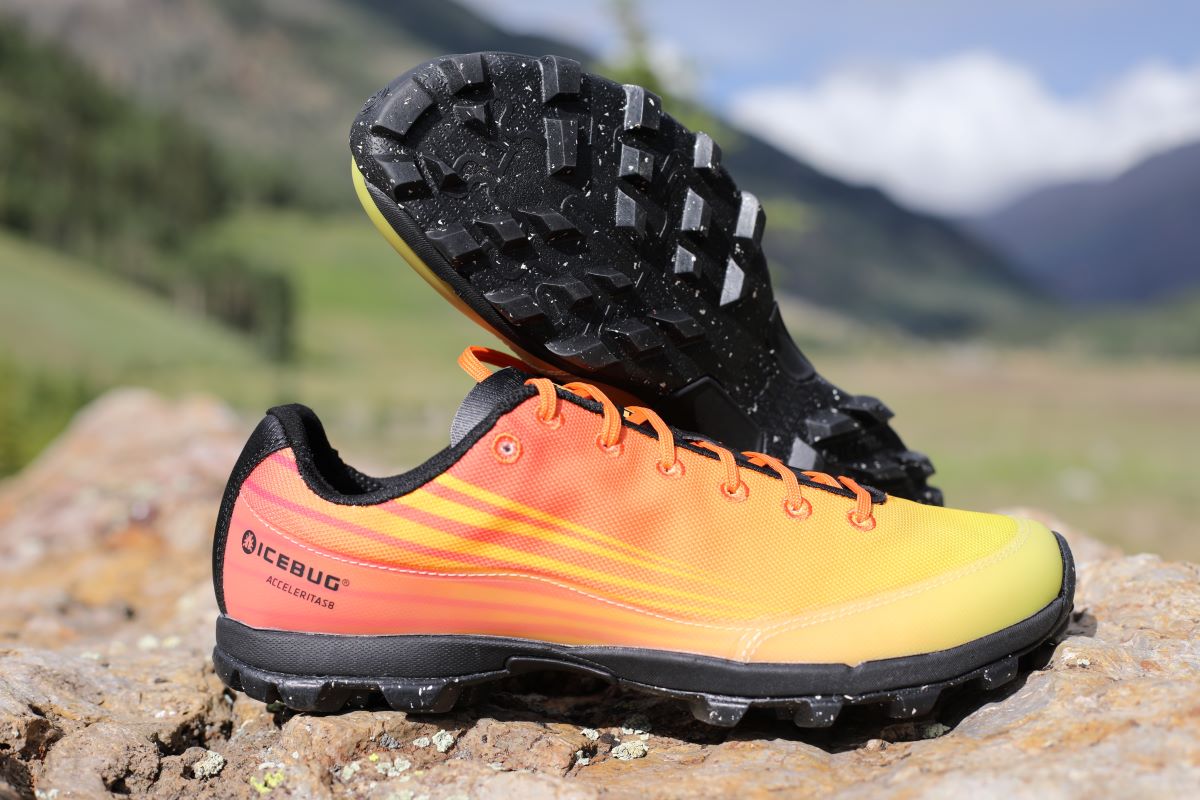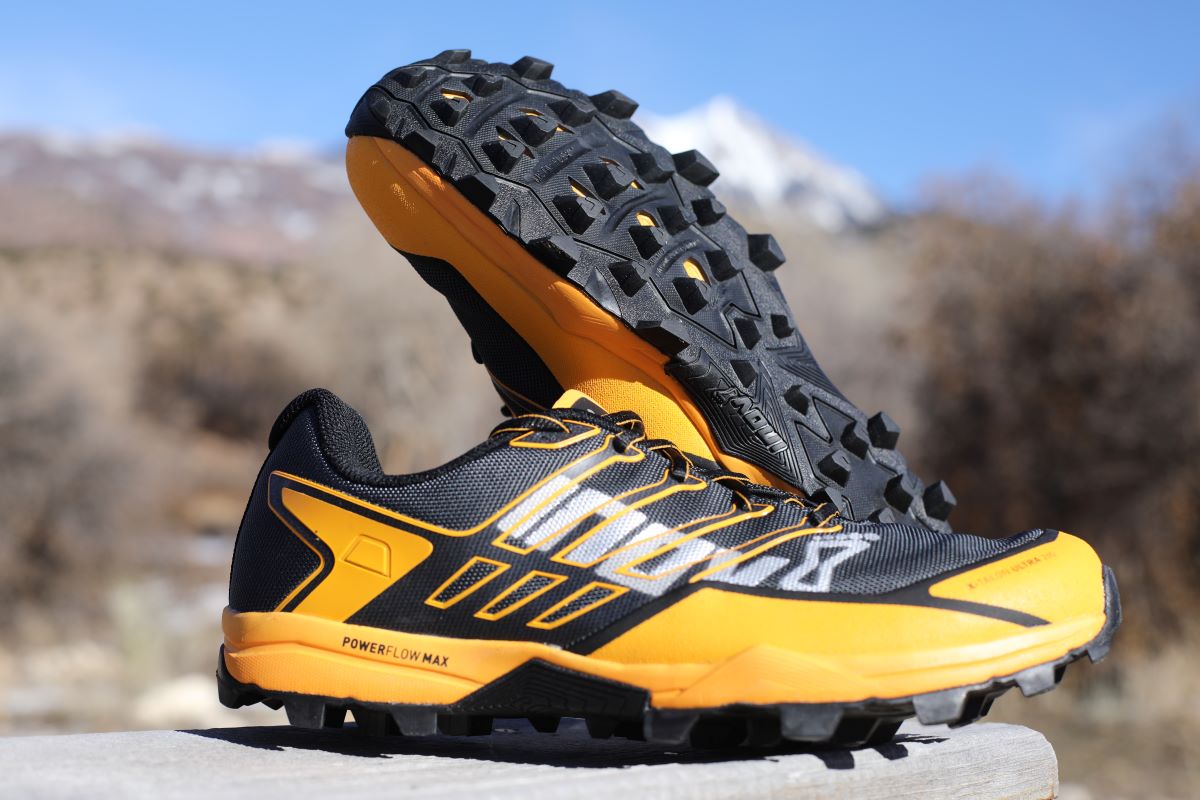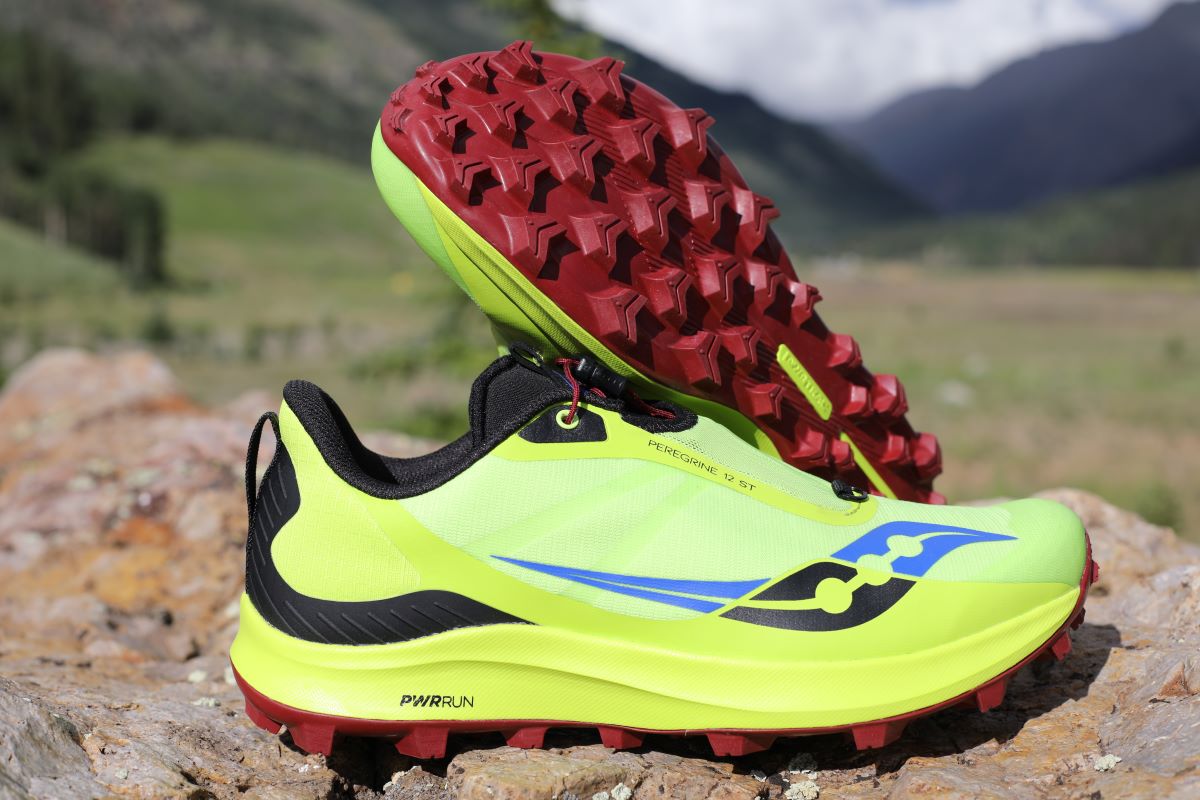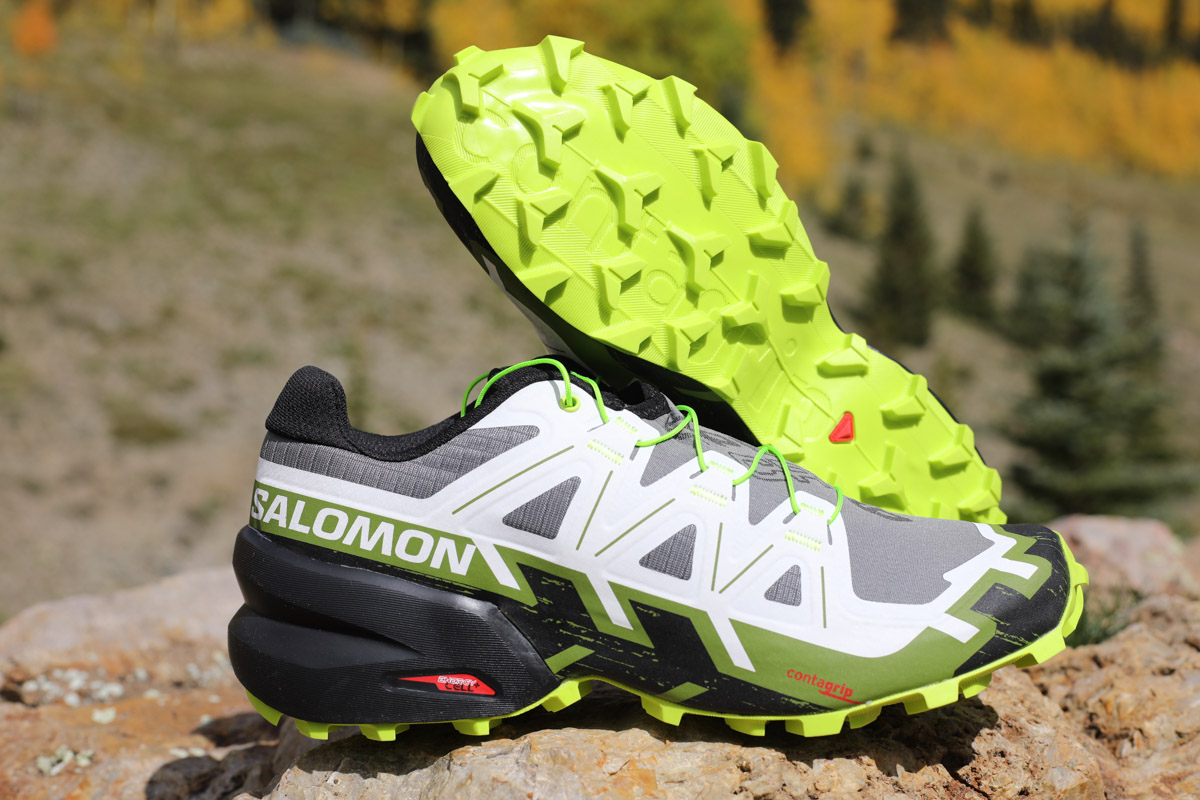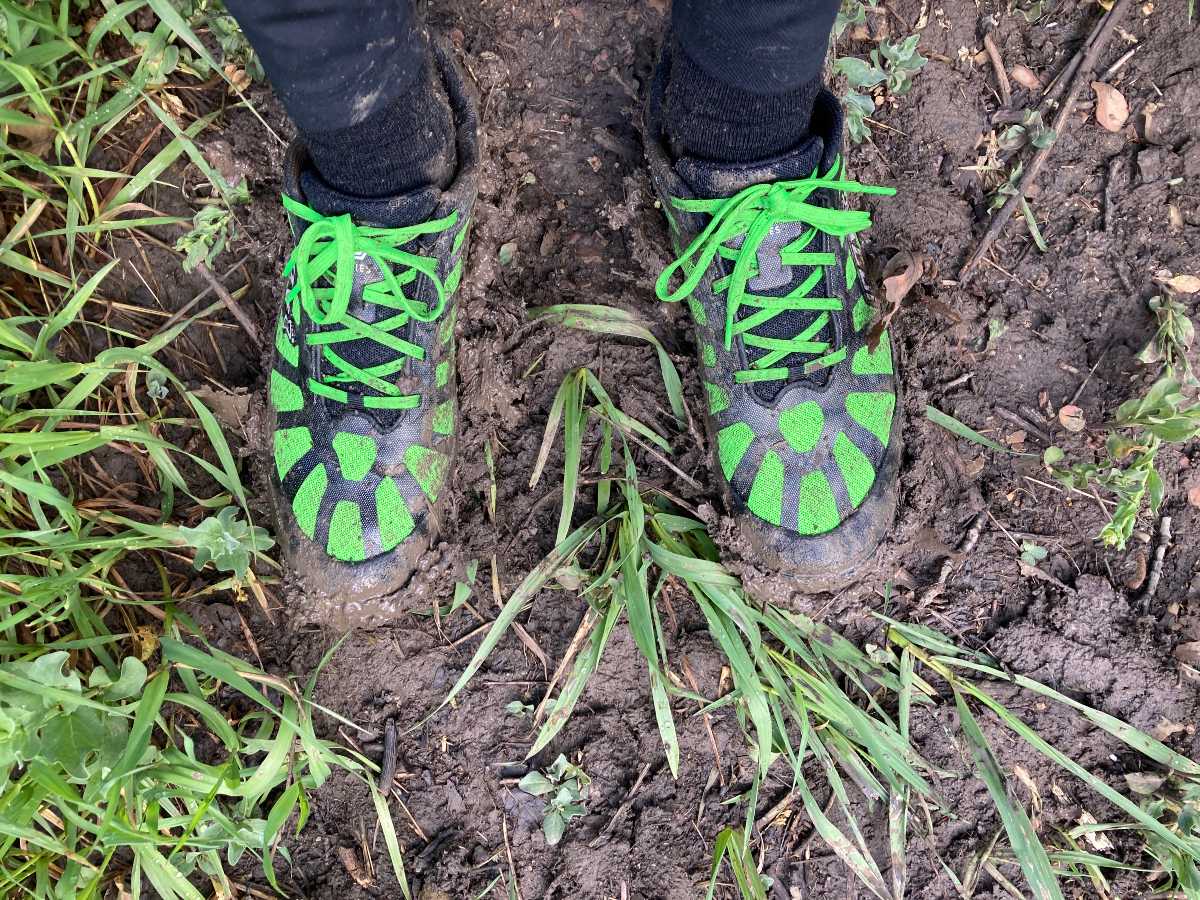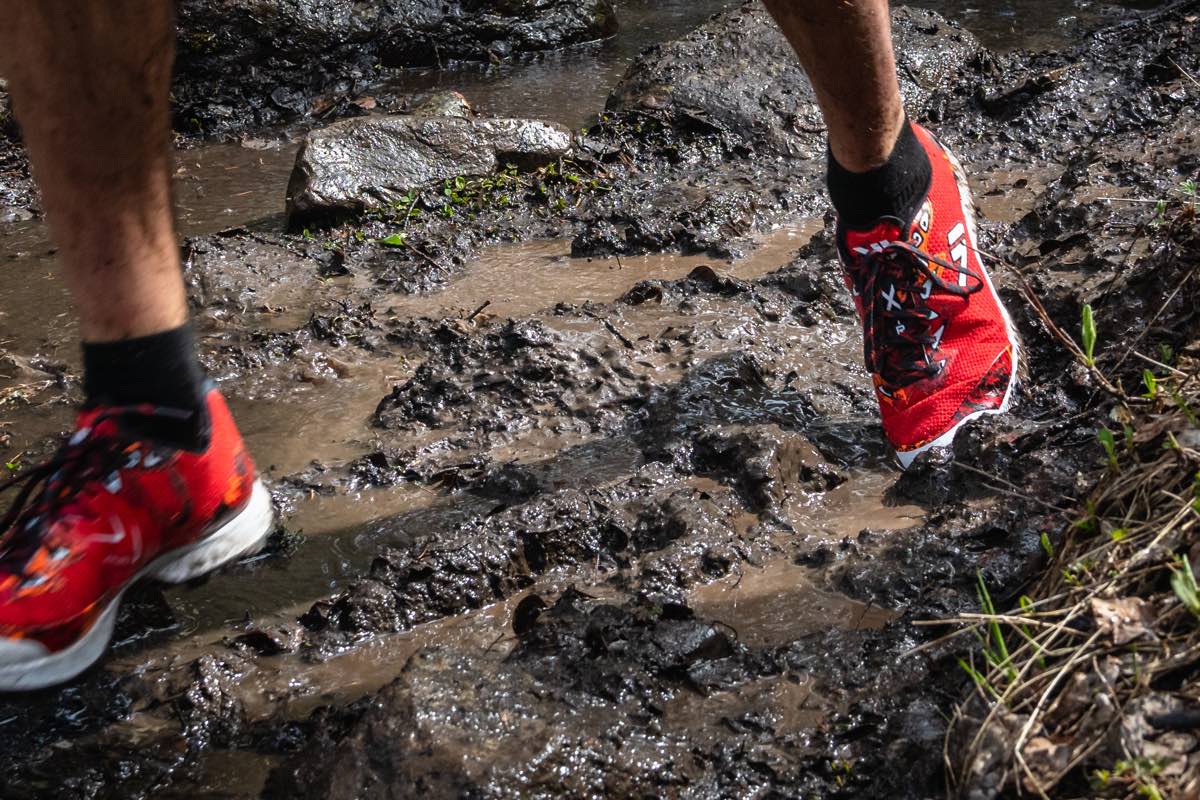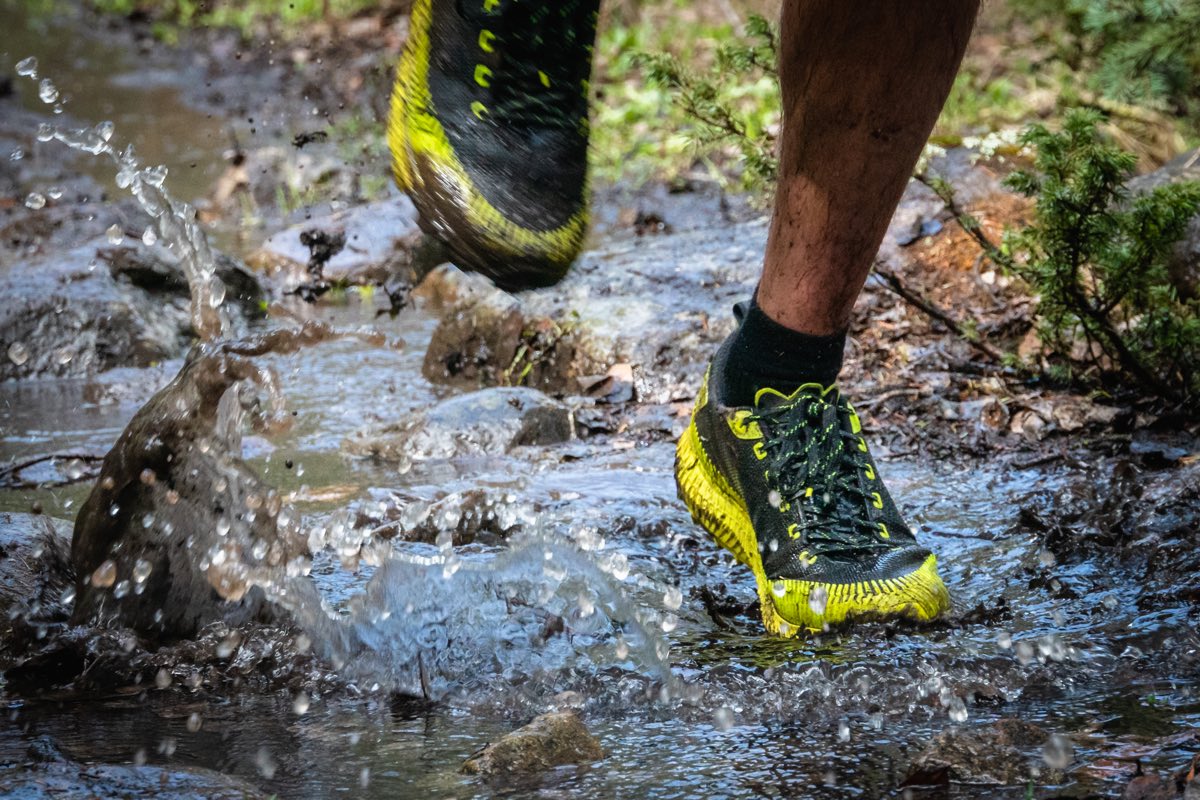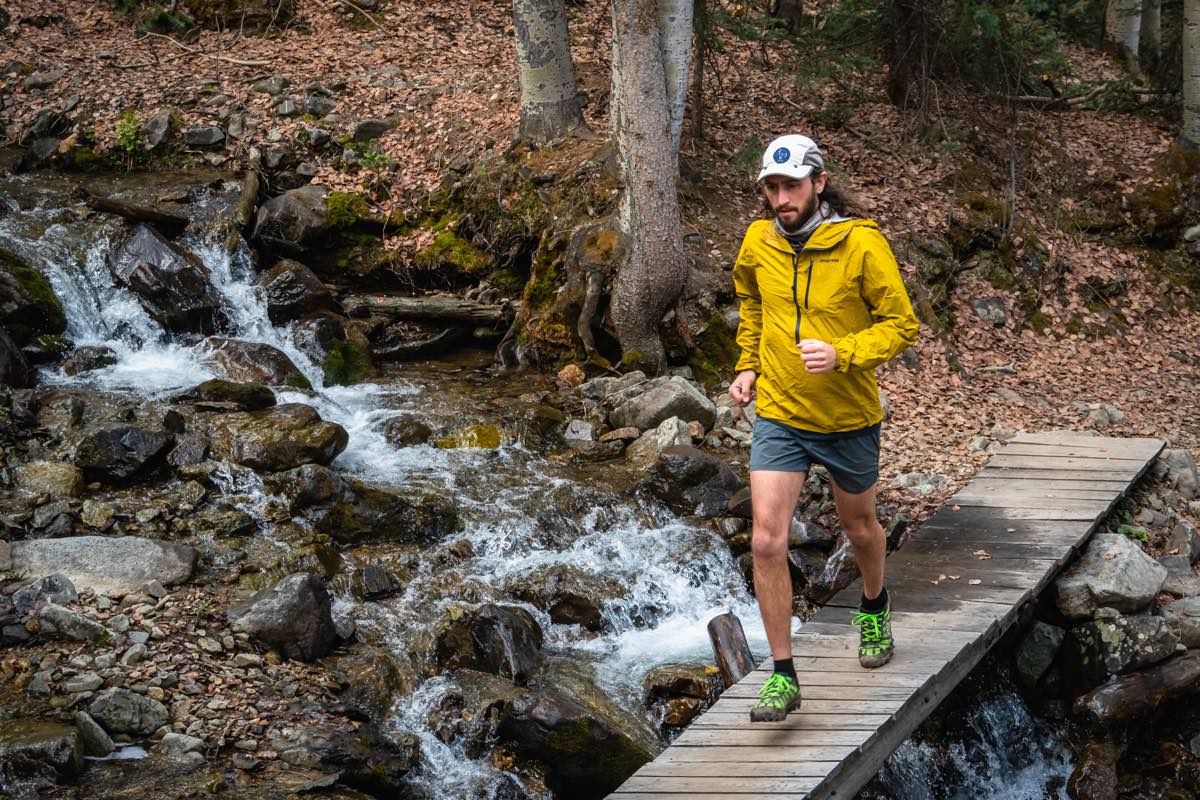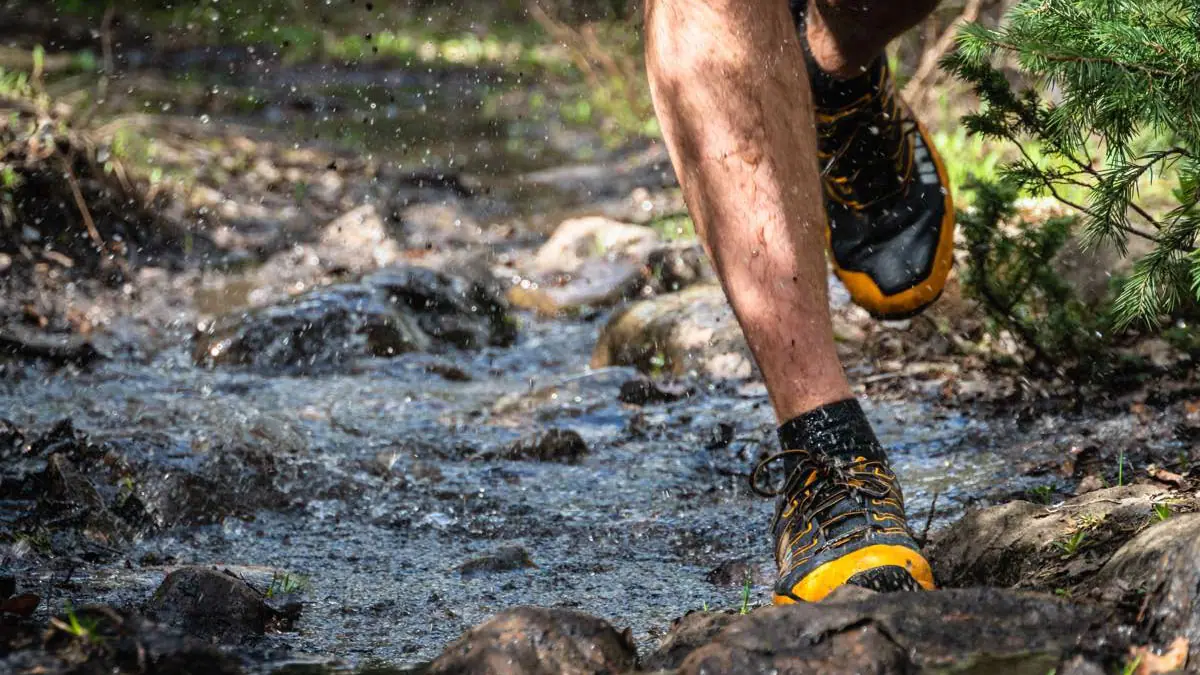
Testing the inov-8 X-Talon Ultra 260 V2, which we named one of the best mud-specific trail running shoes, in Colorado. Photo: iRunFar/Eszter Horanyi
A little rain, or even a lot of rain, isn’t going to prevent dedicated runners from hitting the trail. So when the singletrack gets slippery, the puddles fill, and mud starts to form, you want the best trail running shoes for mud that can take you through all of it confidently.
We researched dozens of trail running shoes for mud and tested 12 of them on trails in Utah, Colorado, Montana, and Oregon. We’ve broken our top picks into two categories: mud-specific shoes and all-terrain mud shoes.
Mud-specific shoes have durable uppers, deep and aggressive lugs, a snug fit, and a low-to-the-ground feel and are designed for fell running in the United Kingdom or perpetually soggy places like the Pacific Northwest region of the U.S. All-terrain mud shoes are more adaptable with moderately deep lugs for traction and tightly woven, durable uppers, but they still perform well in various other kinds of terrain. They often have a more comfortable fit and a more forgiving ride on mixed terrain.
To learn more about selecting the right mud running shoe for you, scroll down to our recommendations on things to consider, as well as our frequently asked questions. Finally, learn more about our research and testing methodology below.
For a look at more generalist trail shoes, check out our best trail running shoes guide. For a look at our favorite overall shoes for roads and trails, check out our best running shoes guide.
Best Trail Running Shoes for Mud
Best Mud-Specific Shoes
Best All-Terrain Mud Shoes
Best Mud-Specific Shoes
Icebug Acceleritas8 RB9X ($140)
“I’m giving this shoe 10s across the board because I am in love,” one of our testers enthusiastically wrote. “Comfortable straight out the box, when I put them on my feet, I felt like a dog whose person just grabbed a leash — ready to go!”
The Icebug Acceleritas8 RB9X is a nearly minimalist, mud-specific shoe with a short stack height, four millimeters of heel-to-toe drop, and deep lugs that almost look like tractor treads. Its upper is constructed from thin, tightly woven, recycled polyester for quick drainage and drying. Redesigned this year with a wider toebox, this shoe’s overall fit is snug without being remotely painful. Mud shoes, in general, tend to be narrow, and many of the shoes that we tested were left off this list because of this fact. Although this shoe was narrow as well, the upper was malleable enough that the narrowness didn’t feel constricting.
One of our testers found these shoes to grip in slippery mud, dash confidently through the dry trail, and transform “Chitty Chitty Bang Bang-style into water vessels through puddle ponds.” She also noted that the uppers were dry after only about 10 minutes in the sun during a warm, high-desert run after being soaked during a full morning of rainfall.
“I never knew one of the missing pieces in my life was the ability to turn my bare feet into tractor wheels,” our most enthusiastic tester continued. “One of the hills I ascended slanted like a Sisyphean mudslide, daring me even to try to go up without slipping down again and again, but the shoes clung to the hillside with a mountaineer’s fortitude, and I was up and over in one go.”
If you run in minimalist footwear and want a mud-specific shoe to add to your quiver, this shoe will serve you well.
Read more in our Icebug Acceleritas8 RB9X review.
Actual Weight (U.S. men’s 9): 8.2 ounces (231g)
Drop: 4 millimeters
Stack Height: n/a
Lug Depth: 8 millimeters
Pros: Quick-drying, near-minimalist shoe; accommodates wider feet
Cons: Minimalist isn’t for everyone
Shop the Men's Icebug Acceleritas8 RB9XShop the Women's Icebug Acceleritas8 RB9X
Inov-8 X-Talon Ultra 260 V2 ($165)
The inov-8 X-Talon Ultra 260 V2 is everything you’d expect from an inov-8 shoe: a durable upper, minimal and firm midsole, and sticky outsole with huge claws for lugging. It is not an everyday shoe for those of us in arid climates, as it will not be comfortable for long periods on hardpack terrain. But if you live in the U.K. or somewhere else rainy where the terrain is soft and provides the cushion that the midsole does not, you might really love these shoes.
Because most of our testers live in places where mud appears only seasonally, we were able to try these shoes in various environments, not just muddy ones. One of our testers wore these shoes for “early-season high-country rambling, a combination of soft off-trail tundra jogging, crossing snowfields, including those with consequence, and scrambling on hard rock with exposure.”
She noted that she felt incredibly confident wearing these shoes in all of these conditions. She also said that powerhiking uphill on hardpack was tolerable but that running back downhill was not ideal.
With eight-millimeter lugs, these shoes excelled in the mud and were able to dig through sloppy conditions to find purchase on the solid surfaces underneath the muck. The lug design cleared any mud quickly. Running on hardpack terrain was a different story. One of our testers noted that it “requires extreme focus on perfect landings and mechanics.” So keep this in mind if you live in an arid place.
We found the upper’s drying time to be fairly slow. On a five-and-a-half-hour mountain run, one of our testers crossed a creek in the first five minutes, and her feet remained wet the entire time. This is to be expected, however, because this shoe’s upper was designed for both durability and for holding in heat. This shoe is made for people who run in wet, muddy, and cold conditions where there’s no chance that their feet will dry, regardless of the shoe they are wearing, until they get home and place them in front of a fireplace.
Actual Weight (U.S. men’s 9): 9.7 ounces (276g)
Drop: 8 millimeters
Stack Height: 16/8 millimeters heel/toe
Lug Depth: 8 millimeters
Pros: Aggressive outsole; warm and durable upper
Cons: Slow drying
Shop the Men's inov-8 X-Talon Ultra 260 V2Shop the Women's inov-8 X-Talon Ultra 260 V2
Best All-Terrain Mud Shoes
Saucony Peregrine 12 ST ($140)
The Saucony Peregrine 12 ST is more than just a mud shoe — it’s a comfortable trail and mountain running shoe with lugs deep enough to grip the wet stuff and dispense with it all the same. Essentially it’s the soft-terrain version of the much-loved Peregrine 12. Read our Saucony Peregrine 12 review to learn more about that shoe.
The fact that this shoe can perform on all types of terrain makes it stand out from many of the other mud shoes that we tested. It has big 6.5-millimeter lugs, so it performs nearly as well as more myopic mud shoes in terms of grip and mud-shedding, but it can also move nimbly down the hard pack when the sun comes out. Saucony’s PWRRUN cushioning is somewhat firm, but at an average of 24 millimeters thick, it provides more comfort than any of the other mud-specific shoes we tested. Notably, it’s also the only shoe on this list with a rock plate.
To keep out debris, this shoe’s upper is constructed from more tightly woven fabric than the non-ST version. It also features a mesh shield to hold the laces.
The speed laces on this shoe are reminiscent of those found on Salomon shoes: very thin static laces with a cord lock for tightening and loosening them. One great thing about these laces is that they don’t absorb water. Some of our testers prefer this system over regular laces because it tends to be more secure and doesn’t snag and come undone when bushwhacking. The laces do feel extremely static, meaning they don’t have the give of normal laces, but this is good for a mud shoe. Secure laces will prevent a foot from popping out of a mud-stuck shoe.
Possibly more important than any of those nitty gritty details, this shoe is just really fun. On a 14-mile run, one of our testers encountered an array of trail conditions. For the first seven miles, the shoe felt light and comfortable on the hard and dry trail, but distant thunder threatened to provide something different. Sure enough, an early-season monsoon turned the trail into a creek, and the shoe was forced to prove that it could handle the mud as well. This shoe didn’t let him down, gripping off-camber singletrack as if the trail wasn’t wet at all.
Read more in our Saucony Peregrine 12 ST review.
Actual Weight (U.S. men’s 9): 10.8 ounces (305g)
Drop: 4 millimeters
Stack Height: 26.5/22.5 millimeters heel/toe
Lug Depth: 6.5 millimeters
Pros: Great versatility; secure speed laces; debris-resistant upper
Cons: Lugs uncomfortable on hardpack
Shop the Men's Saucony Peregrine 12 STShop the Women's Saucony Peregrine 12 ST
Salomon Speedcross 6 ($140)
The Salomon Speedcross 6 is somewhat of an anomaly in that it is one of the most popular shoes found on trails throughout the United States while also commonly used in fell running races in the U.K. With a narrow heel pocket that keeps feet secure and a decently wide forefoot, the latter of which increased in size in the previous version of this shoe, the Salomon Speedcross 5, and has been retained in this edition, this shoe can fit many different shapes of feet, making it a popular option for many styles of running. The upgrades from the previous version of this shoe are subtle but significant, with the new version being lighter, more comfortable, and having improved traction.
The SensiFit design cradles the midfoot, and the extremely secure Quicklace lacing system keeps toes from sliding to the front of the shoe when going downhill. In short, people with feet of all sizes and shapes seem to be able to use this shoe, although one member of the iRunFar team who is a longtime Speedcross wearer did find this iteration to be less secure-fitting on narrow feet than previous versions.
This shoe has a pretty substantial stack height of 32 to 22 millimeters for an overall heel-to-toe drop of 10 millimeters. This makes it feel almost like a hiking boot that has been whittled down to a running shoe, so it’s no surprise that they also suit many hikers well. While this heel stack height may be too much for some people’s preferences, our testers enjoyed how it felt for very long days in technical terrain.
To improve the traction of this shoe in this edition, Salomon changed the shape of the lugs. This also improved its ability to shed mud, and we found that the new lug pattern was also more comfortable when running on hard surfaces. The 5-millimeter lugs had plenty to have traction in mud and snow, and the new design seems to protect the forefoot better than the older chevron pattern.
The EnergyCell+ midsole compound remains unchanged from the previous version of this shoe and provides enough cushion for taking these shoes across hard surfaces. The lack of a rock plate does mean that if you hit a rock just right, you’ll feel it. But for mud, there is ample protection.
Read more in our Salomon Speedcross 6 review.
Actual Weight (U.S. men’s 9): 10.4 ounces (295g)
Drop: 10 millimeters
Stack Height: 32 to 22 millimeters heel/toe
Lug Depth: 5 millimeters
Pros: Durable, debris-resistant upper; roomy toebox
Cons: Large drop; high stack height
Shop the Men's Salomon Speedcross 6Shop the Women's Salomon Speedcross 6
Topo Mtn Racer 2 ($145)
We tested a few popular all-terrain shoes with little to no mud-capability claims, and of those, the Topo Mtn Racer 2 had the best overall performance. This shoe’s heel pocket is narrow enough to keep the foot locked in place when sticky mud tries to pull it off, and the midfoot area hugs even narrow feet. In contrast to many of the other shoes we tested, this one had a roomy toebox that many of our testers enjoyed.
This shoe has relatively square, evenly spaced five-millimeter lugs. Our testers found them to grip satisfactorily in moderate mud and on wet singletrack, but deep, sticky, clayey mud overwhelmed them quickly.
The upper of this shoe really shines, being comfortable without being sloppy. The fabric is tightly woven, and there are very few seams, which is always promising for durability. Indeed, one of our testers has put about a hundred hard desert bushwhacking miles on them without issue. Like some other mud-specific shoes in this list, this shoe’s upper is fairly thick, so it doesn’t dry out quickly but rather keeps the foot warm even when wet.
We should note that these shoes have a little bit of stability, which is not for everyone. But if you have a wide foot and still want a snug-fitting shoe for mud performance, this could be a great option.
Actual Weight (U.S. men’s 9): 10.1 ounces (287g)
Drop: 5 millimeters
Stack Height: 30/25 millimeters heel/toe
Lug Depth: n/a
Pros: Roomy toebox; snug midfoot and heel
Cons: Average mud grip and shedding
Shop the Men's Topo Mtn Racer 2Shop the Women's Topo Mtn Racer 2
Buyer’s Guide: How to Choose a Trail Running Shoe for Mud
Snug Fit
When the conditions outside of your shoe are slippery and unstable, it helps if the conditions inside the shoe are snug and secure. The best trail running shoes for mud will have a snug fit that will help you to find purchase on the muckiest trails by ensuring that your shoe feels like your foot has grown lugs. And when sticky mud tries to swallow your shoe, your foot won’t slide out of it.
All of the shoes that made our list fit most testers snugly without being painful and one shoe was even removed from the list due to sloppy fit.
That said, many of the best trail running shoes for mud on the market seem to be too narrow for the average foot. Our testers thought they knew what they were getting into when they agreed to slip on some of these narrow, snug mud shoes, but they were wrong. To everyone’s surprise, four models we tested that were billed as being either average or narrow in width were still far too cramped to be even remotely usable for any of our testers. These shoes are made for long, skinny, low-volume feet, and if that’s not you, mud shoe shopping could be tricky.
These snuggest shoes may still fit very narrow-footed people and could perform well for fell running, but we could not include them in our list. Because of fit issues, it’s always a good idea to try mud shoes on in a store before purchasing.
Among our favorite mud running shoes, the Salomon Speedcross 6 was clearly the top choice for those looking for a more accommodating fit. The Saucony Peregrine 12 ST and inov-8 X-Talon Ultra 260 v2 are also options worth checking out.
Heel-to-Toe Drop
Mud shoes do not need to be equipped with a particular heel-to-toe drop to perform well. We recommend that you just seek shoes with a drop you feel comfortable in. If you try shoes with more or less drop than normal, you should ease into their use to keep your lower legs happy. There are mud-shoe options ranging from the 4-millimeter drop of the Icebug Acceleritas8 RB9X to the 10-millimeter drop of the Salomon Speedcross 6.
Stack Height
We tested many near-minimalist mud shoes with stack heights in the single digits. The Icebug Acceleritas8 RB9X, for example, has a negligible stack height to keep the runner’s center of gravity low in sloppy and unpredictable terrain. Mud shoes are designed to excel on soft terrain that provides plenty of cushioning already.
This is probably the type of shoe you will want for running in relentlessly muddy conditions such as you’d find in England’s Lake District. Winter running in the U.S. Pacific Northwest could also warrant the purchase of such an aggressive, low-stack shoe.
But not every shoe on our list is this close to the ground. Our testers in Utah and Colorado, who often encounter mud, snow, and hard-packed trails all in one run, appreciate more versatile mud shoes. The Saucony Peregrine 12 ST, for example, has an average stack height of 24.5 millimeters for a more forgiving ride on the hardpack terrain, but it still has deep 6.5-millimeter lugs for traction in mud.
In short, when looking at the best trail running shoes for mud, choose one with a stack height that accommodates the requirements of your local terrain.
Drainage
Mud shoes are designed with the expectation that they will encounter water almost constantly. Shoe manufacturers address this issue in two ways: making shoes with thick uppers to keep debris out and heat in or making shoes with thin, non-absorbing uppers that drain and dry quickly.
Thick, warm uppers might be a good choice for running in muddy and cold conditions, such as you might find in the U.K. There’s a working assumption that your feet will be wet the whole time, so shoe drainage is less important than keeping feet warm when wet. The inov-8 X-Talon Ultra 260 V2 is an example of a shoe with a thick and warm upper that prevents the shoes from filling with debris.
In more variable terrain, such as what most of our testers encounter in Utah and Colorado, a thin, quick-drying upper might be more appropriate. This will keep the shoe as light as possible when wet while also protecting the foot from maceration on longer runs when there’s an opportunity for the shoes to dry out.
For example, in the Wasatch Mountains of Utah in May, our testers plod through mud, snow, and dry trails all in one run. In these conditions, it is nice to have your shoes and feet dry out when you descend from the sloppiest slopes but still have many dry miles to cover on the way back to the car.
Many mud shoes, such as the Icebug Acceleritas8 RB9X, are designed with thin mesh uppers that won’t absorb water. Some even have drain holes to purge pooling water from the inside of the shoe.
Drying
Light mesh uppers don’t just allow water to drain quickly — they also don’t absorb water, aiding in the shoe’s ability to dry rapidly. Many of the best trail running shoes for mud are also constructed with less foam than typical trail running shoes to facilitate quick drying.
Mud running shoes’ tongues will often be thin and nearly foamless. A waterlogged tongue could slide from side to side or otherwise become bunched and uncomfortable. Many mud shoes’ heel pocket padding is similarly scant to keep water absorption at a minimum.
On the other hand, some mud shoes, like the inov-8 X-Talon Ultra 260 V2, accept the fact that when you slosh through mud all day, you’re feet are going to be wet and are built with thick and durable uppers to keep your feet warm instead of trying to be fast-drying.
Uppers
In the same way that mud needs to shed from the lugs of a shoe, it also needs to shed from its upper. Most mud shoes achieve this mud resistance with tightly woven uppers. Very meshy uppers, like those found on many road shoes, are great for breathability but tend to trap debris and mud. The tightly woven upper of the Icebug Acceleritas8 RB9X is thin and plasticky but still permeable enough to allow water drainage.
Lugs
The most obvious characteristic of a mud shoe might be its deep and widely spaced lugs. Deep lugs will dig through the goop to find purchase on rock or firmer soil beneath. They will also shed mud better than small, closely spaced lugs. Only shoes with lugs deeper than five millimeters made our list of mud shoes, with the most aggressive mud shoes, the Icebug Acceleritas8 RB9X and the inov-8 X-Talon Ultra 260 V2 having deep 8-millimeter lugs. Interestingly, there is no consensus on the best lug shape for soft terrain conditions, with rectangles and chevrons being pretty equally used.
Rock Plate
Some of the best trail running shoes for mud are designed with rock plates under the ball of the foot for extra protection. Rocks and roots can lie in wait under the mud and can really beat up your feet if you keep landing on them unexpectedly. When you see these obstacles above ground, they’re easy to anticipate — you can hit a visible rock with an intentionally light landing, but you can’t do this with an invisible one. Choose a shoe with a rock plate, such as the Saucony Peregrine 12 ST, if you want to protect your feet from hidden obstacles.
Shoes like the inov-8 X-Talon Ultra 260 V2 have tread so aggressive that a rock plate is probably unnecessary. Other shoes, like the Topo Mtn Racer 2, have a midsole thick enough to provide enough protection by themselves.
Even Mud Shoes Have Their Limits
Some of our testers wanted us to make sure we mention that not all mud is the same. In Utah, for example, we found mud in alpine areas that is blended with an abundance of organic material to be quite forgiving, purging from the lugs of even non-mud-specific shoes such as the Topo Mtn Racer 2. In Salt Lake City’s foothills, where clay is ever-present, it was a different story. Even the very aggressive inov-8 X-Talon Ultra 260 V2 became like a brick on each foot as it struggled to shed the sticky stuff.
This is all just to say that buying a mud shoe will not 100% ensure that you can run on any type of mud at any time, but it will surely help.
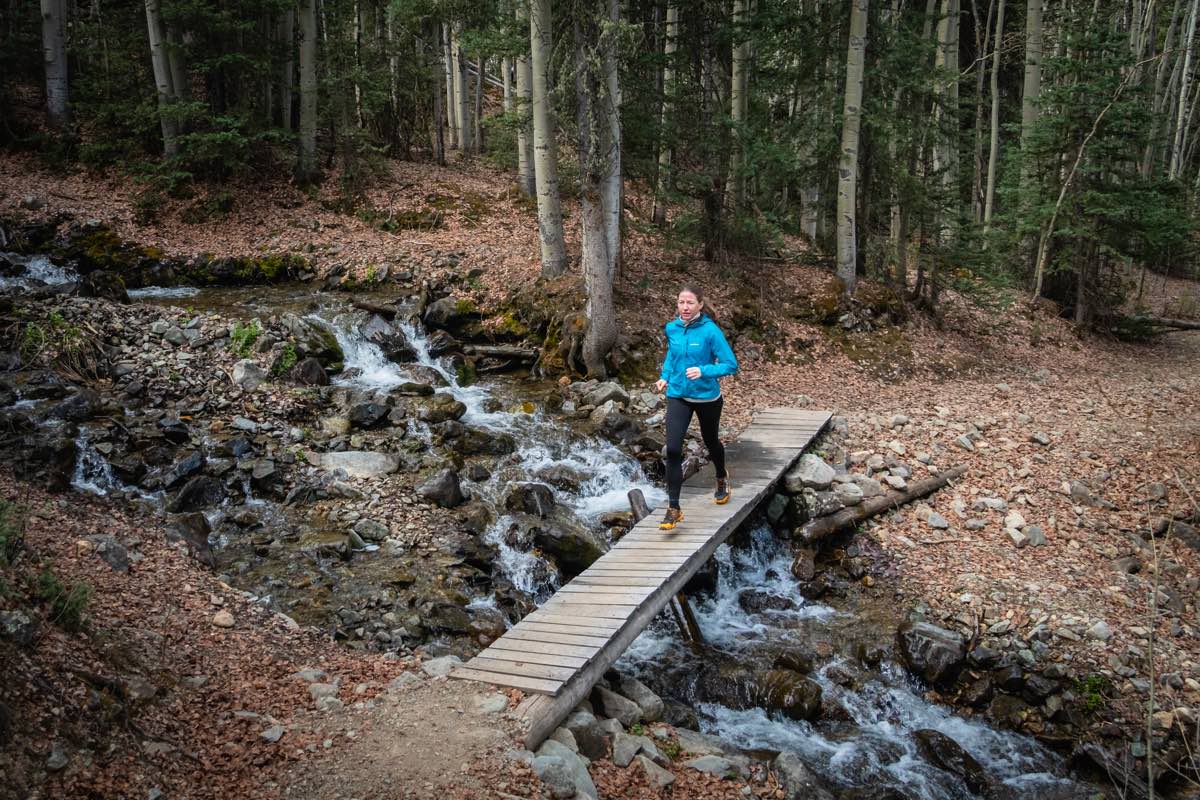
iRunFar’s Meghan Hicks wears the inov-8 X-Talon Ultra 260 V2, which we named one of the best mud-specific trail running shoes. iRunFar/Eszter Horanyi
Why You Should Trust Us
A team of 11 has tested 12 mud running shoes throughout the spring, summer, fall, and winter of 2022 and 2023. We splashed through snowmelt puddles, powerhiked up and then ran back down loose and steep talus, and slogged through mile upon mile of relentless mud. We then compiled and distilled the team’s feedback, and the six shoes we’ve selected for this guide are the consensus favorites.
We acknowledge that many of the shoes we tested are tailored to the perpetually muddy conditions found in the U.K. We didn’t get to test there to allow those shoes to shine. As it stands, many of those shoes were found to be far too narrow for running in spring conditions in Colorado, Utah, Oregon, and Montana. We understand that the narrowness of many of these shoes is intentional, but our U.S. testers found some of them to be totally unusable. Next year, we will revisit many of these shoes and test them in their ideal conditions.
When our team began testing the shoes in the spring of 2022, it was still snowing in the high country, and the snow was beginning to melt in the foothills. Throughout May and June, we ran through snow and mud in the San Juan Mountains of southern Colorado, the Wasatch Mountains of northern Utah, and the drizzly U.S. Pacific Northwest. By mid-summer, we felt confident in our top picks.
Please note that in the running world, product models are routinely discontinued, while new ones frequently come to market. At the same time, we here at iRunFar often keep using our top picks in our daily running … they’re our top picks, after all! Sometimes that continued use results in uncovering product failures. With all this — product discontinuations, product introductions, and product failures — in mind, we routinely update our buyer’s guides based on past and ongoing testing as well as research by our authors and editorial team. While these updates can appear to be us pushing the newest product, it’s anything but that. When we update any buyer’s guide, most of the products are likely to remain the same. That matches our goal: to get you in the best gear that you’ll be using for a long time.

Ben Kilbourne testing mud shoes in the Wasatch Mountains of Utah in spring conditions. Photo: iRunFar/Ben Kilbourne
Frequently Asked Questions About Trail Running Shoes for Mud
What makes mud running shoes different from other trail running shoes? What are the benefits of trail running shoes for mud?
Shoes made specifically for running in mud will have an aggressive tread with deep and widely spaced lugs. They will have a thin, hydrophobic mesh upper to facilitate water drainage and prevent mud from sticking. The tongue and heel pocket will be minimally padded to prevent water absorption. Many mud shoes will have a low stack height and minimal heel-to-toe drop to keep the center of gravity close — and hopefully attached — to the ground. The Icebug Acceleritas8 RB9X barely has any stack and was a tester favorite for its stability.
Do I need a mud-specific trail running shoe?
That depends. Runners who tromp regularly through the hills of Scotland or the temperate rainforests of Oregon or Washington, where mud is often present, might want to invest in a pair of mud shoes. If you’re fell racing or competing in obstacle course races, mud shoes are pretty much mandatory.
Runners in more arid places who encounter mud only seasonally should be able to make do with just about any trail running shoe that has a moderately lugged outsole. We recommend the Saucony Peregrine 12 ST for this use.
Should I run on muddy trails?
When the trails get muddy, it’s often tempting to avoid the puddles and mud altogether by veering off the trail and onto the grass or brush beside the trail, but this can cause problems. According to the Leave No Trace guidelines, runners should always stay on the trail, no matter the conditions. Following this rule will prevent erosion and ensure that the trail does not become increasingly wider.
Some trails, including several that our Utah testers frequent, close completely every time it rains. These trails’ soils are so clayey that running and mountain biking on them when wet could cause significant damage. Always follow a trail’s local guidelines with regard to running in muddy conditions.
In some areas of the world, like the fells of the United Kingdom, running in mud is the norm and doesn’t cause damage to the trails, and the shoes that come out of the region reflect that. Shoes like the inov-8 X-Talon Ultra 260 V2 come from areas known for their muddy trails.
What is fell running?
The word fell comes from the Old Norse word fjall, which means mountain or hill. Fell running basically just means hill running, but these are no ordinary hills we’re talking about; these are the grassy, muddy, steep hills of the United Kingdom.
Fell running is similar to trail, mountain, and cross-country running but with some key differences. In fell running races, contenders race off-trail over wild terrain between checkpoints, often having to use a map and compass for navigation. Sometimes safety equipment such as a bivvy is required. The conditions are almost always steep and slippery, so mud-specific running shoes, like the inov-8 X-Talon Ultra 260 V2, are recommended for safe and successful running.
We did not test any shoes on this list for fell running specifically, but we hope to expand this guide to do so in the future.
What company makes the best mud running shoes?
Because so much mud running takes place in Europe, many of the predominant mud shoe brands are European. Inov-8 and PB Walsh are British brands specializing in deep-lugged, low-stack shoes. VJ is Finnish, Icebug is Swedish, Scott is Swiss, Salomon is French, and Dynafit is Austrian, and all make aggressive, deep-lugged mud shoes. We included some shoes from these companies, including the mud-specific inov-8 X-Talon Ultra 260 V2 and the Icebug Acceleritas8 RB9X.
That said, you may be able to find all-around shoes that perform well in mud from different companies. Saucony, for example, has no history in the English fells but makes an awesome all-arounder that sheds mud with the best of them.
Can I use any trail running shoe in the mud?
You can do whatever you please, but let us share this anecdote: Two of our testers — one in racing flats and the other in mud shoes — were cruising down a muddy, off-camber trail in the Wasatch Mountains of northern Utah when the one in racing flats slipped right off the trail, painting half his body brown. The other tester didn’t even recognize the trail as being slippery at all. Road shoes have their limits, and both testers agreed that any trail shoe with even marginal grip would have prevented his fall. A shoe like the Saucony Peregrine 12 ST is a great option for mixed-terrain runs where you’re out in a variety of ground conditions.
Fortunately, our tester in road flats sustained no injuries in this fall, but in certain steep terrains, a fall can be dangerous, so appropriate shoes are a good safety precaution. Moreover, remaining attached to the ground and not slipping is a fundamental piece of building skills and confidence as a trail runner.
We should also note that for those of us who only have to deal with mud on a seasonal basis in the spring, a good pair of mud shoes can last for years.
Do trail running shoes need to be waterproof?
We chose only non-waterproof shoes for this guide because the iRunFar team prefers mud shoes that drain easily and dry quickly. Waterproof shoes are great for mildly muddy and wet conditions, keeping your toes dry when dashing through shallow puddles or the tops of your feet dry in a drizzle. But when things get really sloppy, and water starts to pour over the top of a waterproof shoe, it will fill up like a bucket.
A shoe constructed from light and thin mesh, such as the Icebug Acceleritas8 RB9X, will drain almost instantly after splashing through puddles. They also dry quickly.
There are very few circumstances when both deep lugs and a waterproof upper would be warranted. When running long distances in snowy and very cold conditions, a waterproof shoe with a gaiter might be exactly what you need.
How important is stack height for mud running shoes?
Because of the nature of running in the mud, which is slippery and unstable, a low stack height can be advantageous. True mud-running shoes, like the Icebug Acceleritas8 RB9X, barely have any stack height at all. By being close to the ground, the best trail running shoes for mud can be much more stable. The downside is that shoes with minimal stack height can be hard to run in on other surfaces, so if you’re running on mixed terrain, it could be worth having a shoe with a reasonable amount of stack, like the Topo Mtn Racer 2.
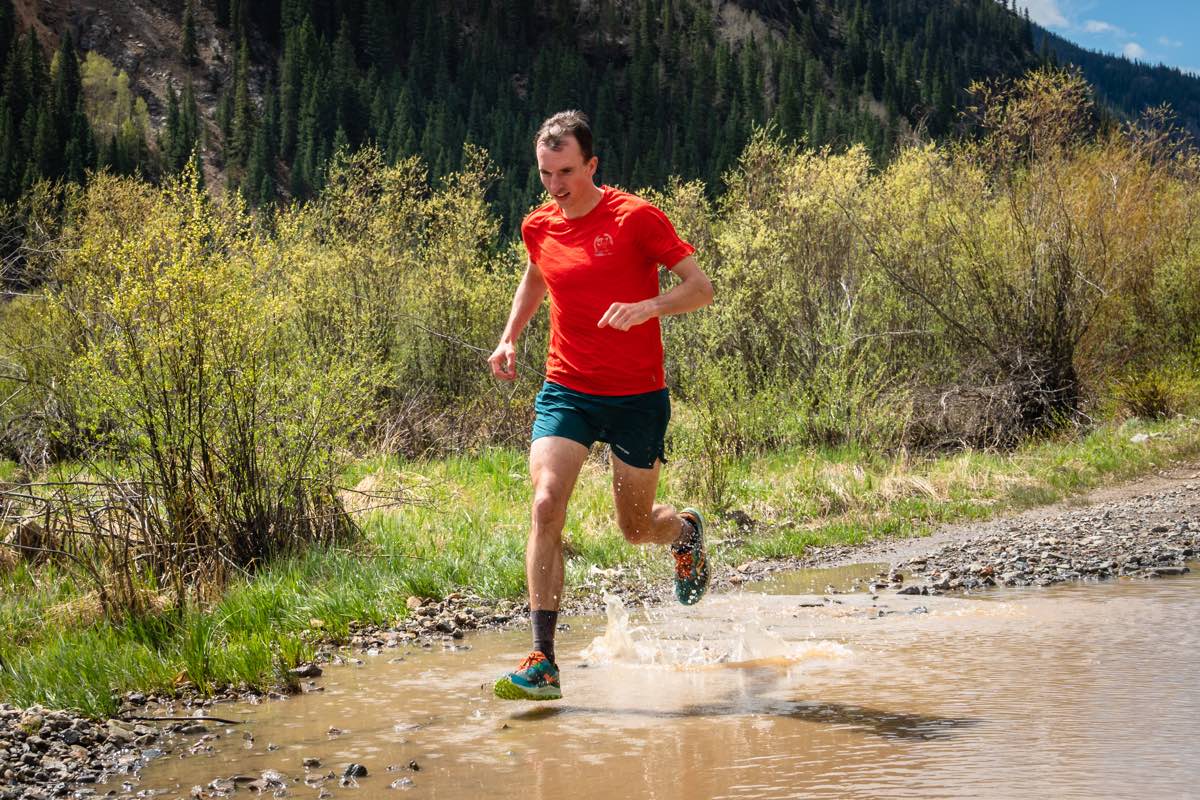
Jeff Rome tests the regular Saucony Peregrine 12 in watery conditions. We named the Saucony Peregrine 12 ST one of the best all-terrain mud shoes. Photo: iRunFar/Eszter Horanyi
Are mud shoes comfortable on trails or pavement?
Most mud shoes are not comfortable for running on hard-packed trails or pavement because they are low to the ground with a minimal midsole. The inov-8 X-Talon Ultra 260 V2, with its rigid lugs, and roughly 12-millimeter stack height, for example, should be reserved for runs that are soupy and slippery from start to finish.
Some mud shoes can make the transition, however. The Saucony Peregrine 12 ST, with its thicker midsole, will roll over firm trail, splash through puddles without losing purchase, and even be tolerable on the quarter-mile of paved road that leads back to the car.
Call for Comments
- What trail shoe do you use in the mud?
- Where do you live where a mud-specific shoe is a must-own part of your quiver?
- When has the mud overwhelmed even your most aggressive mud shoes?
